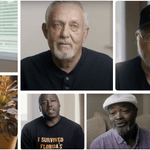
Witness to Innocence, the national organization of U.S. death-row exonerees, has released a series of short videos under the tag “#ImLivingProof,” featuring the stories of men and women who had been wrongfully convicted and sentenced to death. The series, produced by filmmaker Martin Schoeller with funding from the Art for Justice Fund, attempts to personalize the dangers of the death penalty by showing the public living proof that innocent people are sentenced to death.
Eight of the videos are currently available on the Witness to Innocence website, with more scheduled for release. They present the exonerees’ reflections on their experiences with the criminal legal system, their time on death row, the difficulties they face returning to society, and their hopes for the future.
The idea for the “#ImLivingProof video project arose out of a partnership between Witness to Innocence and Represent Justice, a social justice campaign established by the producers of the film Just Mercy, which dramatically depicts the story of Alabama death-row exoneree Walter McMillian. WTI Executive Director Kirk Bloodsworth, the first former death-row prisoner exonerated by DNA evidence, explained why the organization created the video series. “I knew Walter McMillian,” Bloodsworth said. “We were both nearly killed because of a wrongful conviction. And there are 170 more people like us. Through this series of short videos, we want to lift up their voices and show that we are all living proof that the death penalty must be abolished.”

The series premiered with a video featuring WTI Board President Kwame Ajamu, who was a teenager when he was charged with capital murder in Cleveland, wrongly convicted, and sentenced to death. “The death penalty is totally unfair because it is only given to those who are poor,” Ajamu says in his video. “I hate that.”
The videos take viewers from the exonerees’ naïveté when first facing the criminal court system to a combination of hopefulness and grim reality after release. “I thought, well, I’m innocent, I’ll be fine,” Alabama exoneree Randal Padgett said. “But I wasn’t fine.” Florida exoneree Herman Lindsey recounted his incredulity at being sentenced to death. “The day that I heard the judge say ‘we the people sentence you to die by lethal injection,’ I couldn’t understand. How can I be sentenced to death for something I didn’t do?,” he said.
Mississippi death-row exoneree Sabrina Butler Smith, wrongly convicted and sentenced to death on charges of murdering her son, described the misery of confinement on death row in a tiny cell about the size of a bathroom. “It’s like being buried underground with a lid on top of you and you can’t breathe. That’s what death row is like,” she said. She was later exonerated when medical evidence showed that her son had not been murdered at all but had died of natural causes.
Derrick Jamison expressed the joy of freedom: “The day I was released from Ohio’s death row was like the clouds opening and the sun came in,” he said. But that freedom is quickly tempered by reality. Padgett explained the grim reality faced by many exonerees as a result of his wrongful conviction: he lost his home and his job. New Mexico death-row exoneree Ron Keine came within nine days of execution when the killer confessed. “I got out, I’m lucky. There’s the innocent guys on death row who are not so lucky,” he said.
Alabama exoneree Gary Drinkard called for a change in prosecutors’ values. “I want prosecutors to know that it’s more honorable to investigate the crime and get the real killer than it is to get a conviction,” he said. In Keine’s case, the actual killer was a police officer who had been told to leave town by the sheriff so as not to create an issue during an election year. “Your constitutional rights are only as good as the people in charge of you,” Keine said.
The exonerees have dedicated themselves to bring about change. “As long as I keep thinking and keep fighting,” California death-row exoneree Shujaa Graham said, “I know I’m going to make a difference.”
#IMLIVINGPROOF that we Send the Innocent to Die, Witness to Innocence, December 2020 – January 2021.

